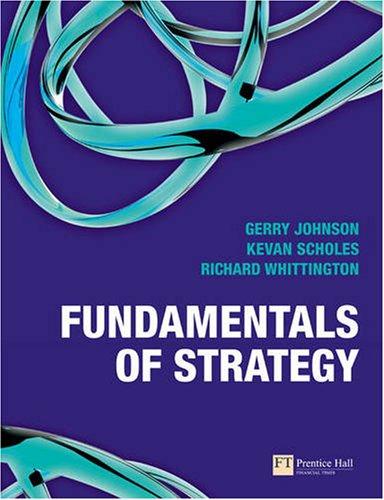Question
Requirements: Determine the strategic goals and classify them according to the Balanced Scorecard perspective. Make recommendations for each goal's metrics. Young Ston, Inc., a consumer
Requirements:
Determine the strategic goals and classify them according to the Balanced Scorecard perspective. Make recommendations for each goal's metrics. Young Ston, Inc., a consumer goods company, hired Sarah Carrillo to lead one of its divisions at the start of the fourth quarter of 2017. The division, which made small household appliances, was struggling to stay afloat in a highly competitive market. Sarah requested a 2017 estimated income statement right away. The controller responded with the following statement:
Sales$35,000,000
Variable expenses10,000,000
Contribution margin$ 6,000,000
Fixed expenses6,000,000
Projected loss$ (2,000,000)
Sarah discovered that the goods being made had a major quality issue after some investigation. She asked the controller's office to conduct a special analysis and include a report on the level of quality costs once more. Sarah issued the following report from the controller by the middle of November:
Inspection costs, finished product$ 400,000
Rework costs2,000,000
Scrapped units600,000
Warranty 3,000,000
Sales returns 1,000,000
Customer complaint department500,000
Total estimated quality costs$7,500,000
Sarah was taken aback by the high cost of quality. They accounted for 30% of total revenue, which is clearly unsustainable. She understood that in order for the division to succeed, it needed to manufacture high-quality items. The number of faulty units produced had to be drastically reduced. As a result, Sarah chose a quality-driven turnaround approach. If quality could be improved, both revenue growth and cost savings could be accomplished. Profitability may be improved by can sales while lowering costs.
Sarah made the following decisions, effective immediately (end of November 2017), after consulting with the manufacturing, marketing, purchasing, and human resources managers:
a. More money will be put into employee training. Workers will be taught how to spot quality issues and given the authority to make changes. Workers would be paid a bonus of 15% of any cost savings realized as a result of their proposed changes.
b. Different design engineers will be hired immediately, with one or two more expected to be hired within a year. These engineers will be responsible for redesigning processes and products in order to improve efficiency. They'll also be tasked with collaborating with a small group of manufacturers to help them improve the quality of their goods and processes. Design engineers were regarded as a strategic requirement.
c. Implement a new method for supplier assessment and selection. The aim of this new process is to find a group of suppliers who are willing and capable of supplying non defective components.
d. The division will begin testing purchased components as soon as possible. Many of the quality issues, according to production, are caused by faulty parts imported from outside suppliers. The incoming inspection is thought to be a transitional operation. This practice will be phased out until the division has formed a group of suppliers capable of supplying non defective components.
d. The division will begin testing purchased components as soon as possible. Many of the quality issues, according to production, are caused by faulty parts imported from outside suppliers. The incoming inspection is thought to be a transitional operation. This practice will be phased out until the division has formed a group of suppliers capable of supplying non defective components.
f. Accounting will be tasked with implementing a high-quality information management system. The types of information needed are daily reports on operational quality data (e.g., percentage of faulty units), weekly updates of trend graphs (posted in the division), and quarterly cost reports.
g. Kaizen costing will be applied to aid in the direction of quality assurance programs. For the year 2017 change OK, for rework costs, a kaizen standard of 6% of the selling price per unit was set, a 25% reduction from the current actual cost.
Sarah started implementing a Balanced Scorecard for the division to ensure that the quality improvements were guided and converted into measurable financial outcomes. Progress had been made by the end of 2019. Sales had risen to $26 million, and kaizen developments had met or exceeded expectations. Rework prices, for example, had fallen to $1,500,000.
At the end of 2020, two years after the turnaround quality strategy was implemented, Sarah received the following quality cost report:
Quality training$ 500,000
Supplier evaluation230,000
Incoming inspection costs400,000
Inspection costs, finished product300,000
Rework costs1,000,000
Scrapped units200,000
Warranty costs750,000
Sales returns (quality-related)435,000
Customer complaint department325,000
Total estimated quality costs$4,140,000
Sarah also received an income statement for 2020:
Sales $30,000,000
Variable expenses 22,000,000
Contribution margin $ 8,000,000
Fixed expenses 5,800,000
Income from operations $ 2,200,000
Sarah was happy with the results. Revenues had increased, and expenses had fallen by at least as much as she had predicted over the next two years. Growth could be even higher next year, as she was starting to notice a positive impact from the higher-quality items. In addition, since incoming inspections revealed much higher quality purchased parts, more quality cost savings should be realized.
Step by Step Solution
There are 3 Steps involved in it
Step: 1

Get Instant Access to Expert-Tailored Solutions
See step-by-step solutions with expert insights and AI powered tools for academic success
Step: 2

Step: 3

Ace Your Homework with AI
Get the answers you need in no time with our AI-driven, step-by-step assistance
Get Started


